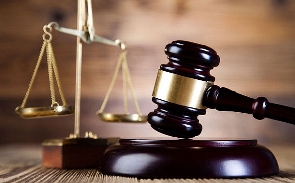Six members of the Divine Healers Church have dragged Registered Trustees of the church and five other executive members to court for their alleged continuous stay in office.
The executive members of the Church were said to have ended their five-year tenure in office, and also exceeded their age limits of 65 years.
However, the defendants contended that they had received prophecies from the “Holy Spirit” to stay in office.
The plaintiffs are: Apostle Daniel Mensah Attakpah, Rev Philip Attakpah, Johannes Ollenu, Rev. Jonathan Nyabu, Pastor Solomon Amenyo and Pastor Ebenezer Nartey.
The defendants are: The Registered Trustees of the Divine Healers Church, Apostles Isaac Kwabena Adade, General Overseer, Maxwell Aryeetey Foster, deputy General Overseer, Kenneth Ashaley Addo, General Secretary, Emmanuel Acquaye, Chairman of the National Youth Ministry and Dora Edith Osekre, National Women’s Fellowship Leader.
In a writ filed at the High Court, the plaintiffs are seeking a declaration that the five out of the six defendants’ continued stay in office was unconstitutional.
The plaintiffs are seeking an order directed at the Registered Trustees ( first defendant) to organise elections for the appointment of qualified members of the Church to replace the five other defendants in their respective current positions.
They are also before the court praying for an order directing the five defendants to render audited accounts to the newly elected and or appoint members taking over respective positions currently being held by said defendants.
The plaintiffs are further seeking damages against the defendants jointly and severally for abusing their positions and having remained and or overstayed unconstitutionally in their offices or position despite their ineligibility.
In the statement of case filed on February 15, 2023, the plaintiff held that the Church started originally as a healing , teaching and deliverance ministry, but developed over the years into “an all-purpose church”.
The plaintiffs said the Church had an organisational structure made up of assemblies , spread over the district and regions of Ghana and abroad.
They said the Church was founded as “The Lord is there Temple” in 1954 by Gilbert Ablorh Lawson and over the years became known as “The Divine Healers Church”.
The plaintiffs said after the death of Gilbert Ablorh Lawson in 1989, the leadership and membership of the Church decided to have a constitution to govern the operations and activities of the Church.
They said the Church finally had a written constitution in 1999 and the constitution provided term limits for all its office holders and age limit for some officer holders.
According to the plaintiffs, the constitution of the Church provided that the national church congress shall be highest administrative and policy making body.
They said the constitution of the Church provided that the term of office of members, National Executive Board (NEB) shall be five years and members would be eligible for re-appointment for a second term of office.
The plaintiffs said the second defendant (Apostle Adade) who was also the head of Administration of the Church, assumed his first term of office in 2006, which ended in 2011 and that he had served a second term from 2011 and ended in 2016.
They contended that in spite of the fact that the second term of office for Apostle Adade expired in the year 2016, he allegedly failed to leave office although there was no constitutional provision for a third term of office.
“The continuous stay of office by the second defendant (Apostle Adade) was unconstitutional, arbitrary and amounts to an attempt by the second defendant to remain in office as a life General Overseer and member of the National Executive Board”.
According to the plaintiffs, Apostle Adade after exceeding the age limit of 65, was not qualified to have stayed or remainedd in office as General Overseer and member of the NEB beyond the year 2011.
They said the defendants could not be in office “by spiritual subterfuge in the name of purported prophesies by the second defendant”.
“The second defendants claim the Holy Spirit has revealed through prophesies that he and his team should remain in office.
“The persons behind the prophecies and place of prophecies are unknown to the members of the Church except the second defendant and his team of beneficiaries.”
According to the plaintiffs any attempt to challenge the purported prophesies was considered as “lack of religious faith in God and belief in God’s word” and considered “abominable act”.
They held that the defendants only applied the Constitution of the Church when it suited them and only when a member was being dismissed.
The plaintiffs alleged that the defendants had without consultation with membership of the Church, engaged a lawyer to amend the Church’s constitution to remove the term limits and age limits and election of church leaders.
They averred that members had become helpless as the defendants continued to hold on to power and needed the order of the court to stop them.
Crime & Punishment of Sunday, 12 March 2023
Source: GNA













